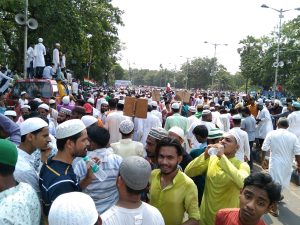The struggle between rule of law and authoritarianism is heating up in India as protests break out across the nation. The protests have been triggered by the arrests of prominent journalists and democracy activists, Teesta Setalvad and Mohammed Zubair, and of whistleblower police officers S.B. Sreekumar and Sanjiv Bhatt.
Secular civil society is in outrage. It sees Setalvad’s arrest as vengeance by the government for criticizing Prime Minister Narendra Modi and for seeking justice for the victims of government-enabled violence in Gujarat in 2002, when he was chief minister of the state. Zubair’s arrest is seen as state vendetta for exposing the insult to Prophet Muhammad made by the national spokesperson of the ruling Bharatiya Janata Party (BJP). The news of the insult spread like wildfire and led to nationwide protests and international condemnations of India by Muslim nations.
Setalvad is an internationally renowned human rights activist and journalist who played a major role in recording and reporting the violence and atrocities committed against Muslim minorities in Gujarat in 2002. She played a significant role in helping the victims of the violence seek justice. For human rights activists everywhere and especially in India, where human rights organizations are harassed and shutdown (Amnesty International is no longer able to operate in India), she is iconic and inspirational. Arresting her and holding her in police custody is a direct attack on the role of the media and civil society. These arrests and similar actions are chipping away at what little democracy is left in India.
Zubair is the co-founder and editor of Altnews.in, a website that fact-checks political statements in India and has often proved to be the bane of Hindutva politicians. His arrest has been condemned widely by opposition leaders in India. These arrests are not isolated. In BJP’s second term in office since 2019, many students, protesting farmers, critical scholars, political activists, and journalists have been arrested or have had charges filed against them to intimidate and silence them.
In recent weeks we saw two mass protests in India. One wave of protests, largely involving Muslims, came after the BJP spokesperson insulted Prophet Muhammad. Some of them turned violent with mobs resorting to pelting stones at the police. The government in retaliation bulldozed the homes of alleged protesters and their leaders. These actions are clearly extrajudicial and unlawful.
But subsequently there were even more widespread protests and more egregious acts of violence and vandalism (including burning of several trains) in opposition to a new policy of temporary military recruitment called Agnipath. No one’s home was bulldozed in retaliation. The different responses send a clear message: When Muslims protested, their homes were bulldozed, and when Hindus protested no homes were bulldozed.
The state and its judicial and law enforcement have been captured in the service of communal politics. This sad reality is widely recognized and appreciated by Hindu nationalists who now attend political rallies with toy bulldozers.
The BJP is systematically targeting India’s civil society in an attempt to ensure that there is neither a record of nor any dissent against its undemocratic policies.
It has weaponized the police and law enforcement agencies and is deploying them to file spurious charges, conduct intimidating arrests, trigger investigations to intimidate critics and dissenting voices. The Indian judicial system too is being used to prosecute its critics.
This use of the state machinery in the service of Hindutva politics is a form of state capture. This phenomenon is eroding the legitimacy of the state and subverting the independence of the judiciary. There can be no democracy or good governance in any society when the state and the judiciary become subservient to a single party, movement, or ideology.
U.S. President Joe Biden has characterized the current nature of global politics as a struggle between authoritarianism and democracy. He and many foreign policy elites in the U.S. and in the West see the world devolving into a bipolar system with the U.S. and its allies leading a democratic bloc against China and authoritarian states that are gravitating toward it. He also sees the decline of democracy itself as a major domestic challenge and thus the jihad for democracy is to be conducted both in the domestic arena as well as on the global stage.
It is in this context that U.S. relations with India are evolving, often anchored by the cliché that this is a partnership between the world’s oldest democracy and the world’s largest democracy. This is also a core idea that underpins the Indo-Pacific strategy – an alliance of democracies seeking to keep the Indo-Pacific region open and prevent China from achieving hegemony in the region. This is a great opportunity for India to become a major player in maintaining the global order, develop a reputation for being a defender of democracy, and in general be seen as a force for good in international relations.
But both India’s dream of a glorious international status and the U.S. goal to gain a major partner in its struggle against China and authoritarianism depend on India remaining a democracy. Unfortunately for the U.S., India under the BJP is determined to destroy India’s secularity and its democracy and will very soon end up in the dustbin of authoritarianism. Can India then still remain in the democracy camp?
I wrote this article while on a short study tour of Gettysburg. I found myself saying “Amen” to the memorable words of President Abraham Lincoln. Today, both India and the U.S. need this prayer to come true: “that the government of the people, by the people, for the people, shall not perish from the earth.”

































